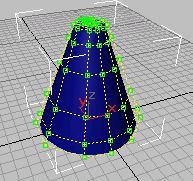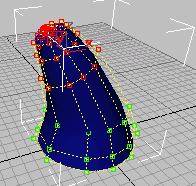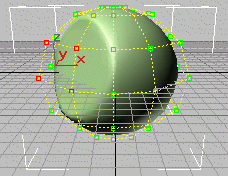Independent curves and independent surfaces both come in two varieties: they are either CV sub-objects or point sub-objects. This topic describes the differences between the two.
CV Curves and CV Surfaces
CV curves and CV surfaces have control vertices (CVs) as do splines. The position of the CVs controls the shape of the curve or the surface. However, unlike spline vertices, CVs don’t necessarily lie on the curve or surface they define. The CVs define a control lattice that connects the CVs and surrounds the NURBS curve or surface. The control lattice displays in lines that are yellow by default.

Cone-shaped NURBS surface with its control lattice (CVs are displayed as green squares)
You can move a CV at the Curve CV or Surface CV sub-object level on the Modify panel. Other transforms, rotate and scale, work as well. Rotate and scale are useful mainly when you have selected multiple CVs.

Moving and rotating CVs to change a surface (selected CVs are displayed in red)
Each CV also has a weight, which you can use to adjust the CV’s effect on the curve or surface. Increasing the weight pulls the surface toward the CV. Decreasing the weight relaxes the surface away from the CV.


Changing a spherical surface by decreasing or increasing the weight of four CVs (selected CVs are at the left, in red):
Above: Weights=0.0
Below: Weights=40.0
Weights can be a useful way to "tune" the appearance of a NURBS curve or surface.
The weight value of a CV is rational (as in a "rational number"). That is, it is relative to other CVs in the curve or surface. Changing the weight of all CVs at once has no effect, because it doesn’t change the ratio between weights.
Points, Point Curves, and Point Surfaces
Point curves and point surfaces are similar to CV curves and surfaces, but the points that control them are required to lie on the curve or surface. Unlike CVs, points do not have a weight.
Point curves and point surfaces can be more intuitive to create and work with. However, working with point sub-objects is slower than working with CV sub-objects. You can think of a point curve or point surface as being dependent on the points to which it fits.
Points that you create individually are the same as the points on point curves and surfaces, except that initially they aren’t part of a curve or surface. You can create a point curve by fitting it to points that you select. When you fit the new point curve, you can use points that are part of curves or surfaces, and individual point sub-objects.